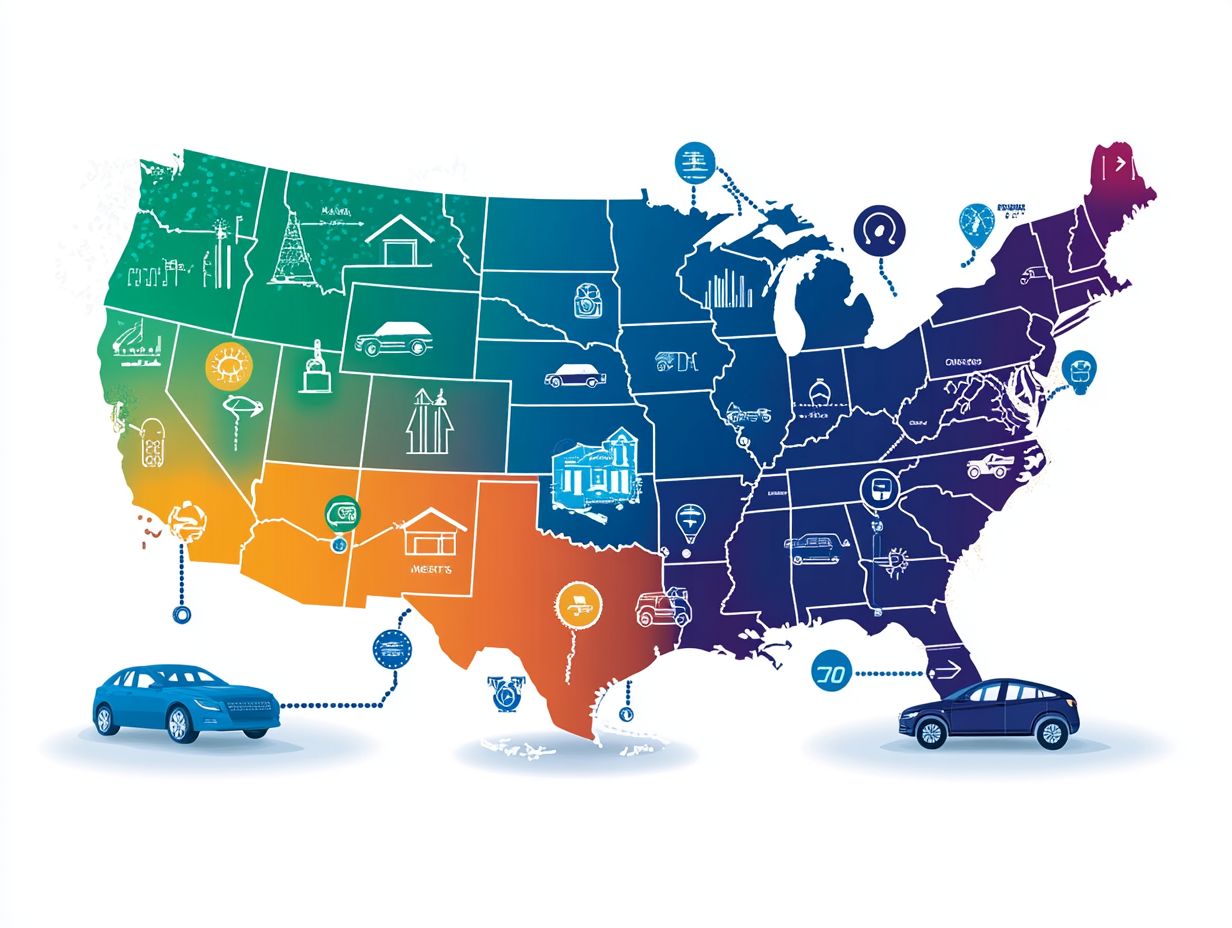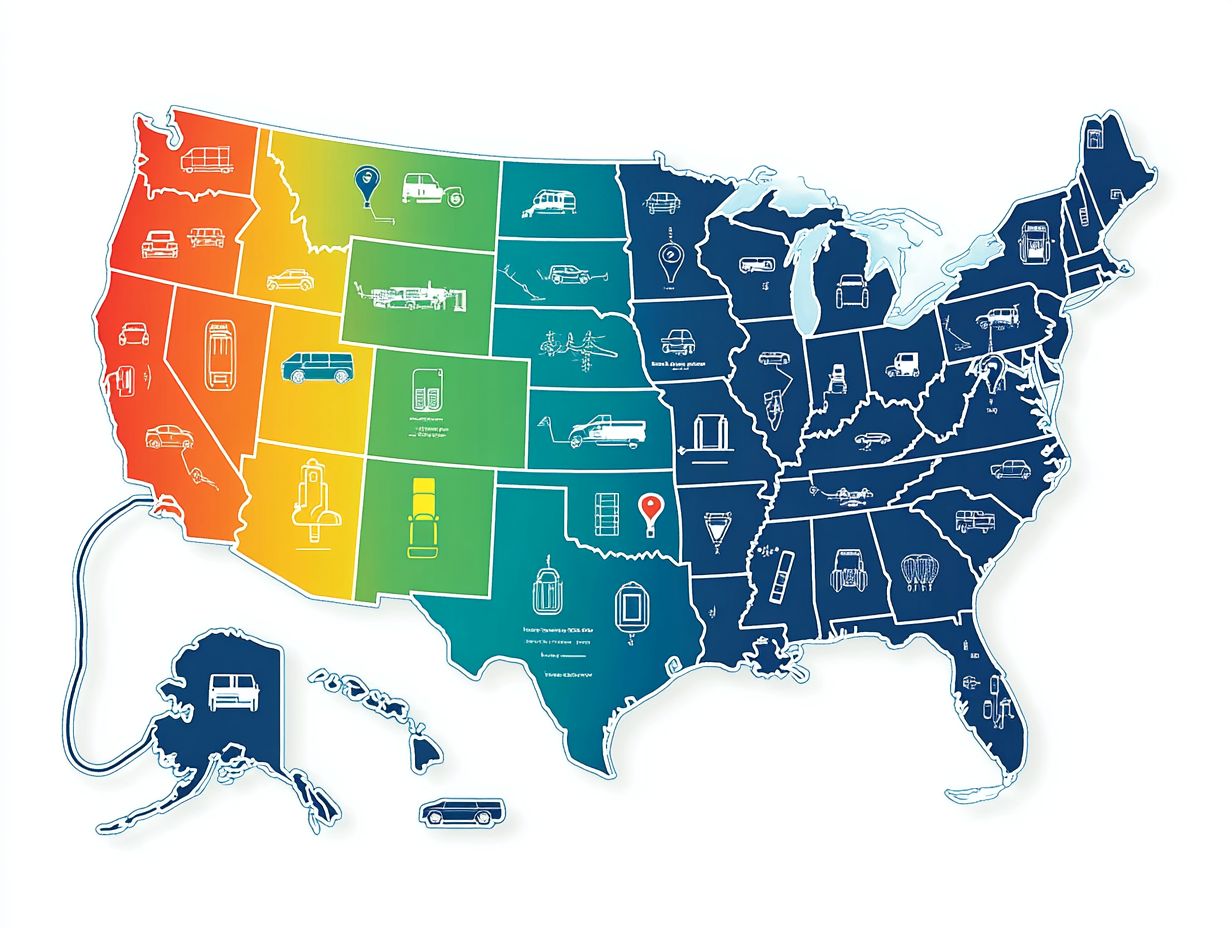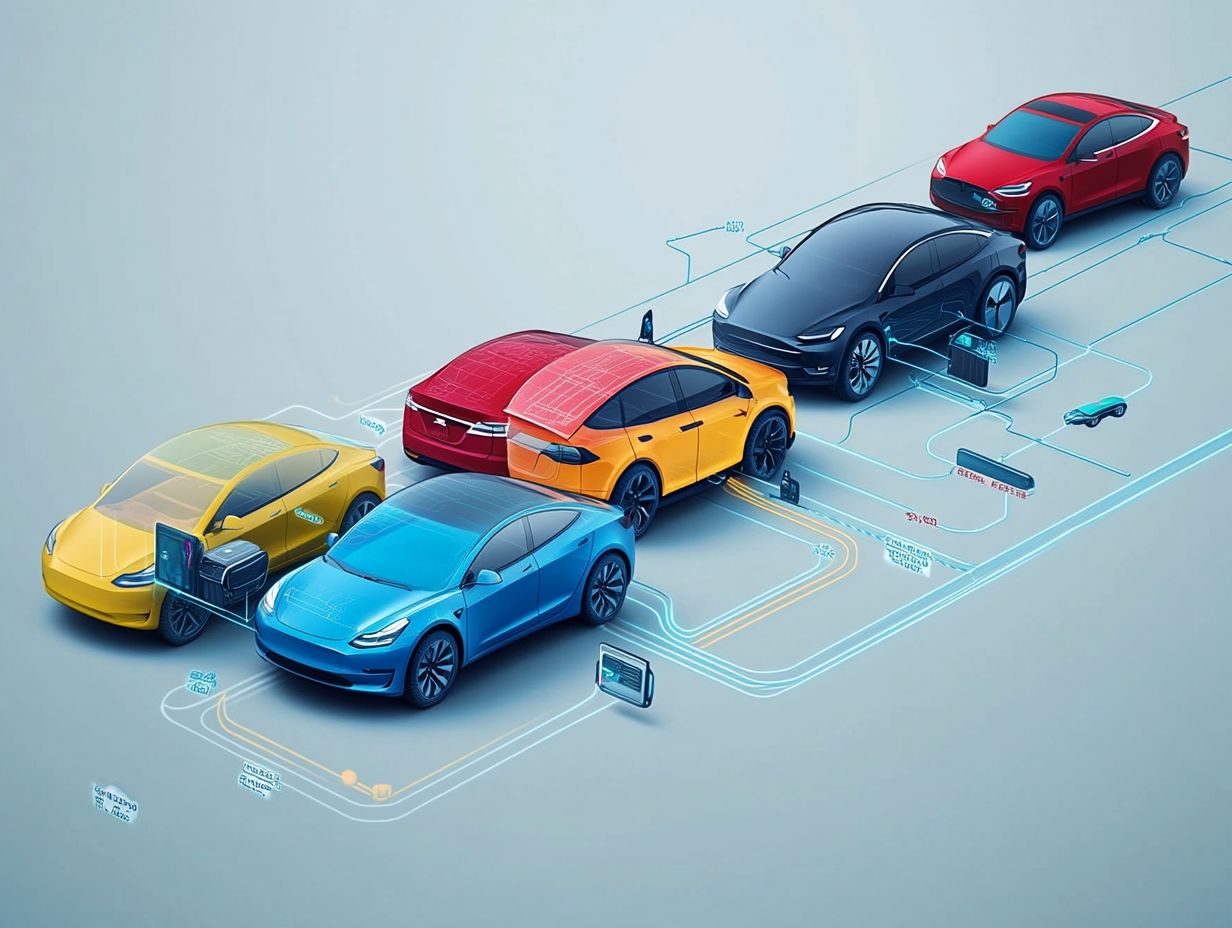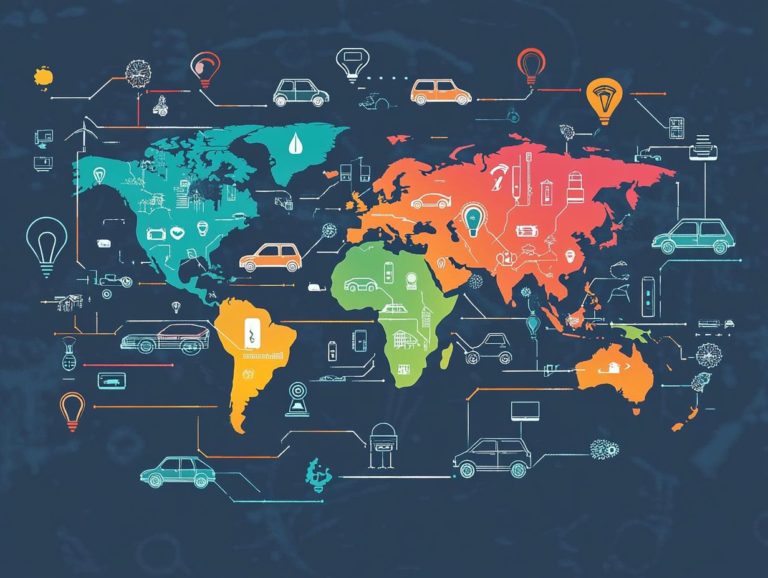How Do Electric Vehicle Incentives Vary by State?
Electric vehicle (EV) incentives offer a great opportunity. They are perfect for anyone thinking about greener transportation.
With a blend of federal and state programs, you can save big on your electric vehicle costs! From enticing tax credits and rebates to local utility perks, there s a treasure trove of financial support at your fingertips.
By understanding the eligibility criteria, you can unlock these benefits. This article explores the various incentives, compares them across states, and guides you on how to take advantage of these opportunities.
Contents
- Key Takeaways:
- Overview of Electric Vehicle Incentives
- Federal Incentives for Electric Vehicles
- State-level Incentives for Electric Vehicles
- Incentives and Benefits
- How to Take Advantage of Electric Vehicle Incentives
- Frequently Asked Questions
- How do electric vehicle incentives vary by state?
- What are some common types of electric vehicle incentives?
- Are electric vehicle incentives available in every state?
- Curious about electric vehicle incentives in your state? Here s how to find out!
- Do electric vehicle incentives only apply to purchases of new electric vehicles?
- What other benefits do states offer to electric vehicle owners?
Key Takeaways:

- Electric vehicle incentives vary by state. Some states offer more benefits than others.
- Both federal and state incentives can greatly reduce your EV purchase costs.
- Electric vehicles also help the environment, paving the way for a cleaner future.
Overview of Electric Vehicle Incentives
In recent years, the shift towards electric vehicles (EVs) has gained remarkable traction. This shift is fueled by growing environmental concerns and the urgent need to cut down on gasoline consumption.
Governments at both the federal and state levels offer a variety of incentives to encourage EV adoption. These include enticing tax credits, generous rebates, and money for building charging stations.
This support champions the move toward cleaner energy. It also addresses the funding challenges for essential projects. Ultimately, this approach serves the public good and fosters a sustainable transportation policy throughout the United States.
Explanation of Incentives
Electric vehicle incentives encompass a variety of tax credits, rebates, and user fees designed to encourage your adoption of EVs. They also help fund charging stations and related projects.
These incentives aim to ease the financial burden you might feel when considering electric vehicles, making them a more appealing choice compared to traditional gasoline-powered cars. For example, federal tax credits can offer you up to $7,500 off the purchase price of eligible electric vehicles, significantly reducing your upfront costs.
Many states also provide rebates that further lower your expenses, helping to close the gap between EVs and conventional vehicles. User fees collected from EV owners can be directed toward developing and maintaining charging networks. This ensures that the infrastructure grows alongside the increasing number of electric vehicles on the road.
This blend of financial support and infrastructure investment has proven vital in boosting adoption rates, particularly in states like California, where robust incentives have led to impressive increases in electric vehicle registrations.
Federal Incentives for Electric Vehicles
Federal incentives for electric vehicles are crucial in promoting EV adoption throughout the U.S. These incentives primarily come in the form of federal tax credits, which help reduce the costs associated with purchasing electric vehicles.
By doing so, they not only make EVs more accessible to you but also significantly contribute to enhancing infrastructure funding.
Tax Credits and Rebates
Tax credits and rebates are essential federal incentives that help you save money when buying electric vehicles. These savings boost the market and encourage more people to choose eco-friendly options.
Financial incentives vary widely. Tax credits reduce the amount of taxes you owe, while rebates offer immediate discounts at the time of purchase.
For example, the federal government may provide a credit of up to $7,500 for eligible electric vehicles. This amount depends on factors like battery capacity and the manufacturer’s sales volume.
State-specific rebates can also lower your upfront costs significantly. For instance, California offers up to $2,000 through its Clean Vehicle Rebate Project.
Keep in mind, income limits can impact your eligibility for these benefits. If your adjusted gross income exceeds $150,000 as an individual taxpayer, you might not qualify for some programs.
The qualifications for vehicles like the type of electric vehicle and the manufacturer often determine who benefits from these incentives.
State-level Incentives for Electric Vehicles

State-level incentives are vital for promoting electric vehicle adoption. Different states have created tailored tax policies that complement federal initiatives and address local needs.
This approach enhances the electric vehicle market, making it more accessible and appealing to consumers.
Comparison of Incentives by State
A comparison of state incentives shows significant differences in the availability of tax credits and other benefits, including tax incentives for EV buyers. These disparities directly influence electric vehicle adoption rates and infrastructure funding across the U.S.
States like California, Colorado, and New York have developed unique strategies to promote electric vehicles. California, for instance, offers generous tax rebates and has built extensive charging networks that boost consumer confidence.
In Colorado, you’ll find a mix of state tax credits and local utility programs that help reduce upfront costs. New York focuses on providing incentives for businesses to set up charging stations, which strengthens the infrastructure for EVs.
These diverse strategies highlight different levels of commitment to sustainability and shape consumer behavior while fostering investment in electric vehicle technology.
Incentives and Benefits
Besides federal and state incentives, local programs and utility provider incentives also promote electric vehicle adoption. These initiatives enhance EV charging infrastructure and address environmental concerns related to emissions reduction.
Local and Utility Company Incentives
Local incentives and utility provider programs encourage your transition to electric vehicles by offering tax exemptions and rebates for charging infrastructure. This makes adopting clean energy more feasible.
In many areas, these initiatives lower charging station costs and create networks that simplify the charging experience. For example, California’s Clean Fuel Reward offers rebates for charging equipment, while New York’s EVolve program provides installation discounts. Utility companies, like Pacific Gas and Electric, also offer time-of-use rates to encourage charging during off-peak hours.
These efforts strengthen the infrastructure needed for electric vehicles and build a community of environmentally conscious consumers, driving the movement towards sustainable transportation.
Environmental Benefits of Electric Vehicles
Electric vehicles do more than just reduce emissions. They significantly lower the carbon footprint associated with traditional gasoline consumption and tackle broader environmental issues.
Research indicates that electric vehicles can lead to approximately 50% lower lifetime greenhouse gas emissions compared to conventional cars, even when you factor in electricity generation. This shift is crucial for our planet! Let s embrace clean energy together!
Governments are increasingly offering incentives for EV adoption. The market is set to experience exponential growth. By 2030, it’s anticipated that up to 30% of new vehicle sales could be electric, representing a pivotal move toward achieving comprehensive climate goals and nurturing a cleaner planet for future generations.
How to Take Advantage of Electric Vehicle Incentives

Discover how to make the most of available financial incentives for electric vehicles. To maximize the benefits of electric vehicle incentives, you must grasp the details of how to apply. This includes understanding tax credits and the eligibility requirements, which can differ significantly based on state and federal guidelines.
Applying for Incentives and Tax Credits
Applying for incentives and tax credits for electric vehicles requires a solid grasp of both federal and state requirements, along with an understanding of the eligibility criteria tied to various money-back programs.
To navigate this process effectively, start by reviewing the IRS guidelines for federal tax credits. This often involves specific forms, like IRS Form 8834, especially for first-time electric vehicle purchases. Since state incentives can differ significantly, it s essential to check your local department of motor vehicles or energy department resources. Each state may have its own unique forms, deadlines, and submission protocols.
To maximize your benefits, keep track of submission timelines and ensure that all necessary documentation is in order to avoid delays. Consulting with tax professionals can also clarify any uncertainties and improve your eligibility for all available rebates.
Understanding Eligibility Requirements
Understanding the eligibility requirements for electric vehicle incentives is essential. These criteria can encompass vehicle qualifications, income limits, and specific guidelines for tax credits and discounts on EVs.
For example, to qualify for federal incentives, the electric vehicle you choose often needs to meet certain performance standards and be manufactured by an eligible company. Some states have their own income caps, which can be either stricter or more lenient than federal guidelines.
Take California, for instance; additional rebates may be available for low- to moderate-income households. Meanwhile, states like Texas focus on benefits based on the vehicle’s battery size. Grasping these nuances ensures you can fully capitalize on the incentives available to you.
Frequently Asked Questions
How do electric vehicle incentives vary by state?
Electric vehicle incentives vary by state depending on several factors, such as state policies, funding availability, and desired outcomes. To learn more about these variations, check out understanding EV incentives by state.
What are some common types of electric vehicle incentives?

Some common types of electric vehicle incentives include tax credits, rebates, and grants.
Are electric vehicle incentives available in every state?
No, electric vehicle incentives are not available in every state. Each state has its own policies and funding availability for promoting electric vehicles.
Curious about electric vehicle incentives in your state? Here s how to find out!
You can find out about electric vehicle incentives in your state by checking the website of your state s Department of Transportation or Energy, or by contacting your local electric utility company.
Do electric vehicle incentives only apply to purchases of new electric vehicles?
No, electric vehicle incentives can also apply to the purchase or lease of used electric vehicles. This varies based on state policies.
What other benefits do states offer to electric vehicle owners?
States offer additional perks for electric vehicle owners. These include free or discounted parking, access to carpool lanes, and lower registration fees.





